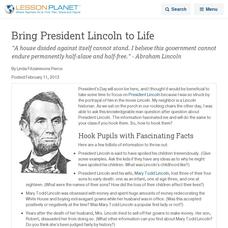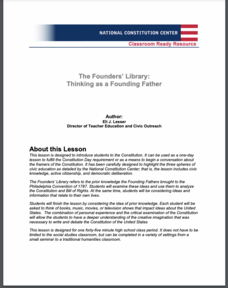Curated OER
Bring President Lincoln to Life
"A house divided against itself cannot stand. I believe this government cannot endure permanently half-slave and half-free." - Abraham Lincoln
iCivics
Congress
Through reading materials, worksheets, and a primary source activity, this resource provides an overview of the structure and powers of the legislative branch of government in the United States. Readings review how a bill becomes a law,...
Curated OER
What is Meant by Returning to Fundamental Principles?
What did the Founding Fathers mean by the importance of continually returning to fundamental principles? Your young historians will analyze a series of quotations illustrating the fundamental ideals and principles of the United States...
Curated OER
The Bill of Rights is for US Today
The first ten Amendments of the U.S. Constitution are vital for young people to understand. Provide the foundation of the laws that govern our country with this junior high school lesson. Groups use the newspaper to identify rights...
Curated OER
Saddam Hussein and Modern Iraq
Take your class through a moment in modern history in this presentation, which details the rise of Saddam Hussein and the dynamics between Iraq and its neighbors during the Persian Gulf War and the current Iraq war. Though slightly...
Curated OER
Lesson 4: The Judiciary: A Brief Introduction to the Courts System
Focusing on the judicial branch of government, the fourth lesson in this series explores the structure of the US courts system. Beginning with an engaging activity based on the short story The Lady or the Tiger, students go on to examine...
Judicial Learning Center
Your 4th Amendment Rights
Americans love to learn about their rights, especially those that protect them from the government's power to invade their privacy. Young people are especially engaged by this topic. An informative lesson explores four Supreme Court...
Constitutional Rights Foundation
Educating About Immigration The DREAM Act
Group members role play state legislators, supporters of and opponents to the The DREAM Act (Development, Relief, and Education for Alien Minors). After listening to the arguments put forth for and against the immigration legislation,...
Curated OER
Early Presidents
Students are introduced to the lives and contributions of the first seven presidents of the United States. They, in groups, conduct further research on one of these president and his political platform and design a presentation for the...
Center for History and New Media
A Look at Virginians During Reconstruction, 1865-1877
The transition between rebellion to reunification was not smooth after the Civil War. Young historians compare primary and secondary source documents in a study of the Reconstruction era in Virginia, noting the rights that were not...
Judicial Learning Center
Law and the Rule of Law
We hear a lot about the importance of the rule of law, but most people do not really know what those words mean. The lesson is a webpage that defines the rule of law, explains why it is important in a democratic society and provides...
Ashbrook Center at Ashland University
Bill of Rights
Do citizens need protection from the federal government? Scholars investigate why the framers of the Constitution created the first 10 amendments and what these amendments mean to citizens of the United States more than 200 years later....
C-SPAN
How A Bill Becomes A Law
Seven steps are required for a bill to become a United States law. The Families First Coronavirus Response Act (H.R. 6201) is used as a model for the process of how a bill becomes a law. Class members work independently through a Google...
Advocates for Human Rights
Refugees and Asylum Seekers
To gain a deeper understanding of the plight of refugees and asylum seekers, class members read stories written from the point of view of an emigrant, map the individual's journey, and note the human rights affected by each stage of the...
Newspaper Association of America
Community Connections with Geography and the Newspaper
Understanding geography and government begins at the local level. Using maps and the parts of a newspaper, a unit plan introduces the concept of community. It starts with the creation of classroom and school maps, and then moves through...
Judicial Learning Center
The Judge and the Jury
Unless you are a lawyer, you might not understand just how unrealistic Law and Order and other legal dramas actually are. Here's a great resource to help scholars of criminology gain a more realistic perspective. The lesson outlines the...
ProCon
President Bill Clinton
Was Bill Clinton a good president? Scholars set out to answer the question as they prepare for a class debate on the topic. They watch videos, review pros and cons, and read facts about the process of becoming a United States president....
Stanford University
Iraq Resolution
The 9/11 attacks propelled the United States into a period of low-grade war that has existed from that day all the way to current times. By looking at documents from the decision to send troops to Iraq in 2006, scholars connect the...
C-SPAN
Choice Board: Expressed and Implied Powers
Article 1, Section 8 of the United States Constitution expressly lists powers given to Congress. Over the years, lawmakers have expanded the enumerated powers to include powers implied by the list. To better understand the significance...
Curated OER
The Kansas-Nebraska Act of 1854: Popular Sovereignty and the Political Polarization over Slavery
Why did Stephen Douglas support the Kansas-Nebraska Act of 1854? Why did Abraham Lincoln oppose it? Young historians examine how the Kansas-Nebraska Act of 1854 affected the political balance between free and slave states and explore how...
Curated OER
The Founders’ Library: Thinking as a Founding Father
Students analyze the U.S. Constitution and the Bill of Rights. In this U.S. government lesson, students examine books, movies, and music that influence them today and then investigate writings that influenced the framers of the...
Curated OER
Kentucky in the Civil War
Seventh graders consider how Kentucky was involved in the Civil War. In this American Civil War lesson, 7th graders view PowerPoint presentations on the topic and then discuss the state's neutrality policy and eventual secession....
Curated OER
Andrew Jackson: 1767-1845
A thorough examination of Andrew Jackson's presidency and politics, these slides contain important facts and pictures of the growing United States. Events such as the Trail of Tears and the Tariff Battles of the early 19th century are on...
iCivics
You've Got Rights!
If aliens invaders nearly destroy the world in the distant future and leaders must decide on a pamphlet of protections to preserve individual rights, what should they include? Introduce the Bill of Rights and the struggle between the...
Other popular searches
- Local and State Government
- Georgia State Government
- Washington State Government
- State Government Missouri
- New York State Government
- Ohio State Government
- Nc State Government
- Texas State Government
- New Jersey State Government
- Oregon State Government
- Illinois State Government
- State Government Branches

























